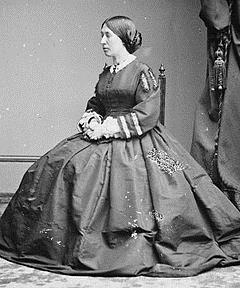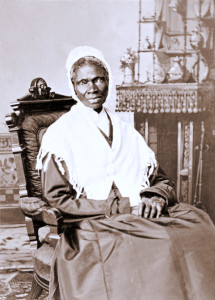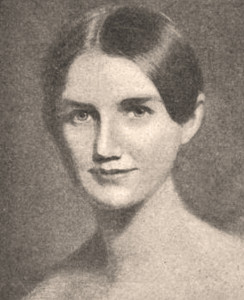
Julia Grant, wife of General U. S. Grant of the Union Army, is one of several women found in Cokie Roberts new book, Capital Dames.
Maybe you know Cokie Roberts from NPR. Maybe you have read her books, Ladies of Liberty, Founding Mothers and We Are Our Mothers’ Daughters. Or maybe you have had the opportunity to hear her speak. Cokie Boggs Roberts is a truly talented speaker and author. The daughter of Senator Hale Boggs of Louisiana, she grew up in Washington, DC. Yet she values her Louisiana and Southern heritage. So when Capital Dames appeared in print last month, I wondered how she would address the issue of women in the Civil War.
Mrs. Roberts handled it with great finesse, with a sympathetic understanding of both sides. Her focus is primarily on women in Washington or Washington City as it was then called. Through diaries, letters, newspapers and memoirs Roberts presents a collection of women of all classes and races who for at least four years called the city home. The vast majority of the women in the first years were wives and daughters of Congressmen, the Chief Executive, and various other powerful men. These are the women who sat in the Galleries to listen to speeches while showing off their finery, who lavishly entertained, and volunteered for worthy causes. As they listened to the speeches on the floor of both the House and the Senate, the women were able to intuitively realize the outcome of the debates over Secession. These women were close friends, who reluctantly parted ways in 1861.

President Abraham Lincoln welcomed Sojourner Truth, former slave and leading abolitionist, into his office during the busy days of the Civil War.
As the war began in earnest, Roberts continued to write about events in Washington, the fear of invasion by the Confederate Army, Lincoln’s frustrating search for a military leader, and the political ploys many of Washington’s women attempted while trying to help their husband rise in rank. Since Lincoln had instituted an Open Door policy to the White House, anyone could walk in the front door to request an appointment with the president. Wives took advantage of the situation.
By 1863 the town, and it was a town of 40,000 people at the beginning of the war, seemed to burst at its seams. Wounded soldiers, fleeing slaves, and women seeking employment as government clerks all arrived to become a part of the scene. Roberts tells the story of abolitionists, nurses, and those pushing for the right to vote. Washington and the women who lived there are at the center of the vortex.
Each chapter covers events of a specific year in the Civil War. Many of the women became famous, others never knew a moment of notoriety, yet all contributed to life in Washington. Many of the stories were familiar while others were either completely new or told from a totally different viewpoint.

Elizabeth (Lizzie) Blair Lee played a significant role in nursing Mary Lincoln after the assassination of President Lincoln.
In the last chapter, Roberts punctuates the chaos of the end of the war, the assassination of Lincoln, and the Grand March of the Union Army in a staccato pace. It was such an eventful but sad time. Of course, Mary Lincoln is one of the central figures. Others included Dorothea Dix, Claire Barton, and Sojourner Truth.
Roberts looks at events in Washington from 1860 to 1865 with a positive eye. She sees the beginning seeds of Civil Rights, increased rights for women, as well as changes in medical care in wartime. She quotes a conversation between President Abraham Lincoln and Sojourner Truth in which he explained he “would not have been able to emancipate the slaves if the South had not seceded.” What a testimony to such a tragic time.
